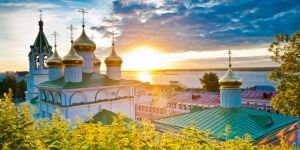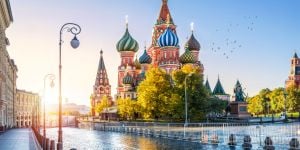There are different types of taxes in Russia. These apply to residents as well as to non-residents, in accordance with certain conditions. To be considered as a Russian resident, you must have stayed in the country for at least 183 calendar days. Otherwise, you will be considered to be a non-resident. In both cases, you will have to pay income tax if you are working in Russia, including on revenue which you are earning from another country.
Non-residents will need to pay income tax based on their salary in Russia. Hence, you will have to apply for a tax number with the Federal Tax Service. This number will be required for all your tax transactions.
Tax deductions
In general, income tax in Russia is deducted at source. This means that your income tax will be deducted from your salary by your employer. However, you will be eligible to refunds at your next payments in case of overpayment. If your income tax is not deducted at source, you will have to pay it in cash at the nearest tax office to your place of residence on the 15th of July at the latest.
If you are paying tax in Russia, you may be eligible for certain deductions, namely if:
- '¢You have made donations to recognised institutions (up to 25% of your income)
- You have had expenses related to a family member's education (capped)
- You have a dependent family member (capped)
- You are contributing to a complementary pension plan (capped)
- You have spent 28,000 Russian roubles for medical care
- You have purchased a property (capped at one million Russian roubles per year).
Tax declaration
You will have to fill in a tax declaration form, which is known as the Nalogovaya Declaratia, if your income tax is not deducted at the source. You may collect the form at the nearest tax office to your place of residence or on the www.3-ndfl.info website (which is in Russian only). It is best to visit the nearest tax office with a Russian firned if you are not comfortable with your level of Russian.
Rates
Russia has a flat tax rate which applies to tax residents.You qualify as a tax resident if you have spent at least 183 calendar days in the country. A flat rate of 13% will be deducted from your income. Non-residents who spend less than 183 days in the country will have to pay income tax at a rate of 30% on all their Russian-sourced income.
Russian sources of income
Russian sources include the following:
- Earnings if you are under a working contract in Russia
- Income from the sale of property in Russia
- Profit from another individual's property in Russia
- Rental income received from property located in Russia
- Dividends earned from Russian companies
- Interest received from Russian companies or individual entrepreneurs
- Dividends received from Russian subsidiaries of foreign companies
- Any other type of salary received in Russia
Exemptions
Here is a list of tax-exempt transactions which, however, do not apply to expatriates:
- If you have sold a home or property which you have held for more than 3 years
- If you have received interest on deposits with Russian banks (under certain conditions), from the stock market, pension funds or any disability pensions.
Double taxation
Many countries have signed a treaty to prevent double taxation with Russia. You are advised to check with your country's tax authorities before moving to Russia.
Useful links:
Federal Tax Service
Federal Tax Service - Tax Office Locator
KPMG ' Russian Tax System
We do our best to provide accurate and up to date information. However, if you have noticed any inaccuracies in this article, please let us know in the comments section below.








